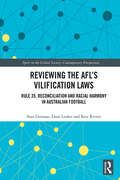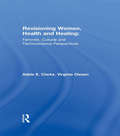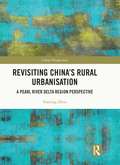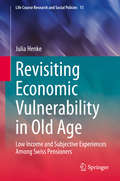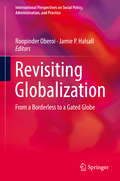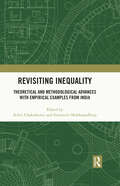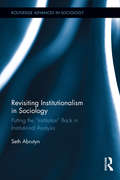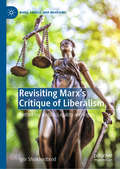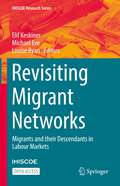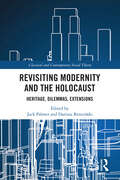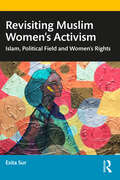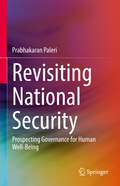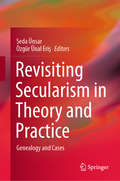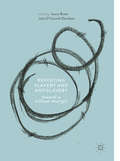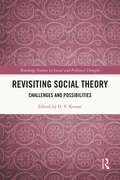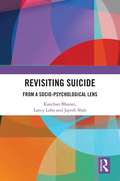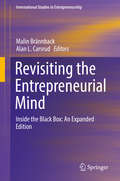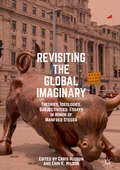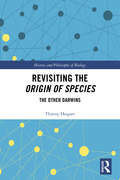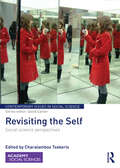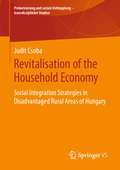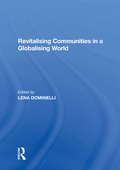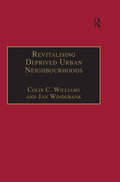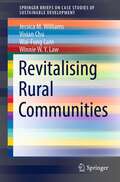- Table View
- List View
Reviewing the AFL�s Vilification Laws: Rule 35, Reconciliation and Racial Harmony in Australian Football (Sport in the Global Society – Contemporary Perspectives)
by Dean Lusher Sean Gorman Keir ReevesThis book is the outcome of an Australian Research Council (ARC)-funded project titled Assessing the Australian Football League’s Racial and Religious Vilification Laws to Promote Community Harmony, Multiculturalism and Reconciliation, which investigated the impact of the Australian Football League’s anti-vilification policy since its introduction in 1995. With key stakeholders the Australian Football League, the AFL Players’ Association and the Office of Multicultural Affairs (previously the Victorian Multicultural Commission), the book gauges the attitudes and perspectives of players and coaches in the AFL regarding Rule 35, the code’s anti-vilification rule. The overarching themes of multiculturalism, reconciliation and social harmony in the AFL workplace have been the guiding ideals that we examined and analysed. The outcomes from the research vectors look at and engage with key issues about race, diversity and difference as it pertains to the elite AFL code, but also looks at the ongoing international conversation as it pertains to these themes in sport. This book was previously published as a special issue of Sport in Society.
Revising Eternity: 27 Latter-day Saint Men Reflect on Modern Relationships
by Stephen Carter Ted Smith Dan Smith John Doe David Nicolay Joey Franklin Kevin Barnwell Scott Blanding Joseph Broom T. Kay Browning Michael Carpenter Tyler Chadwick Kelland Coleman John B Dahl Scot Denhalter Theric Jepson Clyde Kunz Scott Russell Morris Thomas W Murphy Boyd Jay Petersen Robert Raleigh Robert A. Rees Eric Robeck Caleb Scoville Kim Siever Nicholas Don Smith Andrew SpriggsMarriage’s central role in The Church of Jesus Christ of Latter-day Saints distinguishes the faith while simultaneously reflecting widespread American beliefs. But what does Latter-day Saint marriage mean for men? Holly Welker presents a collection of essays exploring this question. The essayists provide insight into challenges involving sexuality, physical and emotional illness, addiction, loss of faith, infidelity, sexual orientation, and other topics. Conversational and heartfelt, the writings reveal the varied experiences of Latter-day Saint marriage against the backdrop of a society transformed by everything from economic issues affecting marriage to evolving ideas about gender. An insightful exploration of the gap between human realities and engrained ideals, Revising Eternity sheds light on how Latter-day Saint men view and experience marriage today.
Revisioning Women, Health and Healing: Feminist, Cultural and Technoscience Perspectives
by Adele E. Clarke Virginia OlesenThis engaging collection examines the implications and representations of race, class and gender in health care offering new approaches to women's health care. Subjects covered range from reproductive issues to AIDS.
Revisiting China's Rural Urbanisation: A Pearl River Delta Region Perspective (China Perspectives)
by Daming ZhouThis book analyses the urbanisation of rural China in the period of the country’s reform and opening-up based on an investigation of five villages in the Pearl River Delta region, analysing progress, problems and future prospects in the light of long-term investigations on the ground and follow-up fieldwork. Drawing on a vast body of data obtained from participation observation, interviews, archival documents, questionnaires, and oral histories, the author charts the trajectory of urbanisation as rural landscapes, governance models, social structures and development dynamics have morphed into urban phenomena. Stimulated by outside capital and pro-growth policies, each of the five villages has undergone a distinct economic, social, institutional, cultural and demographic transformation while facing challenges and opportunities such as land requisition, residential areas with a strong concentration of migrants, changing power relations between state and local community, the influence of traditional lineage and clan structures and quandaries over identity. The book will appeal to scholars and students of sociology and Chinese Studies as well as general readers interested in contemporary China and Chinese urbanisation.
Revisiting Economic Vulnerability in Old Age: Low Income and Subjective Experiences Among Swiss Pensioners (Life Course Research and Social Policies #11)
by Julia HenkeThis book offers an interdisciplinary analysis of the experience of economic vulnerability among older adults. Drawing on various fields ranging from happiness, economics to stress research, it integrates assessments from objective and subjective measurement perspectives. The book offers nuanced insights into prevalent experiences of low economic quality of life in wealthy countries, using empirical data from Switzerland. A sample of some 1500 adults aged 65-84 is taken as the basis for a systematic comparison of the demographic and socioeconomic characteristics of three – overlapping – groups of potentially vulnerable pensioners: those who are income-poor (objective measure), those who report difficulties making ends meet (subjectively self-assessed measure) and those who worry about not having enough money for current expenses (subjectively perceived measure). Theoretical and empirical evidence is offered for the distinctiveness of the two subjective indicators, one of which assesses the experience of economic strain while the other captures the individual’s response in terms of stress. The conceptual contribution of this research includes a typology of economic vulnerability: eight distinct profiles emerge at the intersection of the objective, self-assessed and perceived measures. These profiles correspond to specific risk constellations, and they reflect varying degrees of human agency in dealing with economic vulnerability.
Revisiting Globalization: From a Borderless to a Gated Globe (International Perspectives on Social Policy, Administration, and Practice)
by Jamie P. Halsall Roopinder OberoiThis provocative volume takes an international, multidisciplinary approach to understanding globalization and assessing its economic, social, and environmental effects. Representing the Global North and South, it addresses important debates stemming from recent political events in the U.S. and U.K., the continuing rise of information technology, and the constant struggle between corporate interests and the health of the planet.The human outcomes of world human rights challenges are considered in the ongoing global narratives of migrants, refugees, and disabled persons, as well as possibilities for greater social equity and integration.This expert synthesis takes critical steps to reshape the concept of globalization from an amorphous mass of objectives and initiatives to a forward-looking model of clarity and balance. Included in the coverage:Globalization and migration: is there a borderless worldA comparative assessment of climate policies of top emitters.Neo-protectionism in the age of Brexit and Trump.Working inclusively and redefining social valorization in the globalized world.Understanding the strategy of M&As in the globalized perspective.Reappraisal of social enterprise in a globalized world. Revisiting Globalism will be of particular interest to those in the academic field and the statutory and nonprofit sectors whose work deals with teaching social sciences in higher education settings.
Revisiting Inequality: Theoretical and Methodological Advances with Empirical Examples from India
by Achin Chakraborty Simantini MukhopadhyayThis volume discusses the current state of knowledge on the conceptual understanding of inequality. The book poses a range of empirical puzzles in the Indian context and examines inequalities across categories of the region of residence, caste, and sex, using a fascinating range of outcome indicators, comprising education, health, earnings, self-employment, and crime.The empirical chapters of this volume use various large-scale secondary data sources to expose the deep-rooted, structural inequalities in the Indian society. It answers some of the pertinent questions around inequality such as why do the backward regions of India continue to remain backward, both in terms of economic and human development indicators? Why do enterprises owned by backward caste individuals have systematically lower business earnings? Are backward castes and women more likely to face crime when their relative status improves? How do the circumstances that children find given at birth influence their learning outcomes? etc.The book will be of interest to teachers, students, and researchers of economics of education, development studies, development economics, and Indian economics. It will also be useful for policymakers, academicians, and anyone curious to learn about inequality.
Revisiting Institutionalism in Sociology: Putting the “Institution” Back in Institutional Analysis (Routledge Advances in Sociology #116)
by Seth AbrutynThere may not be a concept so central to sociology, yet so vaguely defined in its contemporary usages, than institution. In Revisiting Institutionalism in Sociology, Abrutyn takes an in-depth look at what institutions are by returning to some of the insights of classical theorists like Max Weber and Herbert Spencer, the functionalisms of Talcott Parsons and S.N. Eisenstadt, and the more recent evolutionary institutionalisms of Gerhard Lenski and Jonathan Turner. Returning to the idea that various levels of social reality shape societies, Abrutyn argues that institutions are macro-level structural and cultural spheres of action, exchange, and communication. They have emergent properties and dynamics that are not reducible to other levels of social reality. Rather than fall back on old functionalist solutions, Abrutyn offers an original and synthetic theory of institutions like religion or economy; the process by which they become autonomous, or distinct cultural spaces that shape the color and texture of action, exchange, and communication embedded within them; and how they gain or lose autonomy by theorizing about institutional entrepreneurship. Finally, Abrutyn lays bare the inner workings of institutions, including their ecology, the way structure and culture shape lower-levels of social reality, and how they develop unique patterns of stratification and inequality founded on their ecology, structure, and culture. Ultimately, Abrutyn offers a refreshing take on macrosociology that brings functionalist, conflict, and cultural sociologies together, while painting a new picture of how the seemingly invisible macro-world influences the choices humans make and the goals we set.
Revisiting Marx’s Critique of Liberalism: Rethinking Justice, Legality and Rights (Marx, Engels, and Marxisms)
by Igor ShoikhedbrodRevisiting Marx’s Critique of Liberalism offers a theoretical reconstruction of Karl Marx’s new materialist understanding of justice, legality, and rights through the vantage point of his widely invoked but generally misunderstood critique of liberalism. The book begins by reconstructing Marx’s conception of justice and rights through close textual interpretation and extrapolation. The central thesis of the book is, firstly, that Marx regards justice as an essential feature of any society, including the emancipated society of the future; and secondly, that standards of justice and right undergo transformation throughout history. The book then tracks the enduring legacy of Marx’s critique of liberal justice by examining how leading contemporary political theorists such as John Rawls, Jürgen Habermas, Axel Honneth, and Nancy Fraser have responded to Marx’s critique of liberalism in the face of global financial capitalism and the hollowing out of democratically-enacted law. The Marx that emerges from this book is therefore a thoroughly modern thinker whose insights shed valuable light on some of the most pressing challenges confronting liberal democracies today.
Revisiting Migrant Networks: Migrants and their Descendants in Labour Markets (IMISCOE Research Series)
by Louise Ryan Elif Keskiner Michael EveThis open access book provides new conceptualisations on the networks of migrants and their descendants in accessing the labour market. Although references to social networks are common in discussions of migration, simplified ideas of co-ethnic networks often obscure the reality, for example confounding ties with co-ethnics and ‘strong ties’. This open access book addresses key questions about the role of networks in migration contexts, particularly in relation to how migrants and their descendants, access the labour market and develop their employment trajectories over time. Rather than adopting a narrow essentializing ethnic lens, the research presented in this book explores intersectional identities of class, generation and gender. By focusing on the kinds of capital circulating between ties, including the dark side of social capital, the book offers insights into power dynamics and the potentially exclusionary dimension of networks. Taking a long term view, across generations, the research in this book shows how migrants and their descendants mobilize resources to tackle discrimination and enhance their position within particular labour markets. Drawing on robust quantitative and rich qualitative data, this book provides a primary source to students, scholars and policy-makers focusing on issues of migration, social networks, social mobility as well as labour market inequalities.
Revisiting Modernity and the Holocaust: Heritage, Dilemmas, Extensions (Classical and Contemporary Social Theory)
by Jack Palmer Dariusz BrzezińskiZygmunt Bauman’s Modernity and the Holocaust is a decisive text of intellectual reflection after Auschwitz, in which Bauman rejected the idea that the Holocaust represented the polar opposite of modernity and saw it instead as its dark potentiality. Bringing together leading scholars from across disciplines, this volume offers the first set of focused and critical commentaries on this classic work of social theory, evaluating its ongoing contribution to scholarship in the social sciences and humanities. Addressing the core messages of Modernity and the Holocaust that continue to sound amidst the convulsions of the present, the chapters situate Bauman’s volume in the social, cultural and academic context of its genesis, and considers its role in the complex processes of Holocaust memorialisation. Offering extensions of Bauman’s thesis to lesser-known and undertheorised events of mass violence, and also considering the significance of Janina Bauman’s writings in their own right, this volume will appeal to scholars of sociology, intellectual history, Holocaust and genocide studies, moral philosophy, memory studies and cultural theory.
Revisiting Muslim Women’s Activism: Islam, Political Field and Women’s Rights
by Esita SurThis book traces the evolution of organisational activism among Muslim women in India. It deconstructs the 'Muslim woman' as the monolith based on tropes like purdah, polygamy, and tin talaq and compels the reader to revisit the question of Muslim women’s individual and collective agency. The book argues that the political field, along with religion, moulds the nature and scope of Muslim women’s activism in India. It looks at the objectives of four Muslim women’s organisations: the Bazm-e-Niswan, the Awaaz-e-Niswaan, the Bharatiya Muslim Mahila Andolan and the India International Women’s Alliance (IIWA), in close interaction with the political landscape of Mumbai. The book explores the emergence of gender-inclusive interpretation of Muslim women’s rights by Muslim women activists and challenges the dominant and reductionist stereotypes on Muslim women, community, and absolutist ideas of Islam. It argues that Muslim women are not passive victims of their culture and religion, rather they can develop a critique of their marginality and subjugation from within the community. Revisiting Muslim Women’s Activism traces the evolution of a community-centric approach in women’s activism and records a fragmented view on women’s rights from within the community and religious leadership. It also delineates the distinctiveness of this activism that considers religion and culture as resources for empowerment and as sites of contestations. Moreover, the book documents the narratives of Muslim women’s struggle and resistance from their location and lived experiences. It will be of interest to students and researchers of women’s studies, gender studies, political science, sociology, anthropology, law, and Islamic studies.
Revisiting National Security: Prospecting Governance for Human Well-Being
by Prabhakaran PaleriThis book examines the evolving concept of national security and how human systems could be governed in an ever turbulent and dynamic world. It takes a revised look at the concept of national security, previously researched and identified by the author, based on the present context but with a futuristic appreciation of governance, primarily national but extended to global perspectives, in the modern and dynamically shifting world. The book emphasises the need for governments to maximise national security for the well-being of their people. The concept of national security is taken as the key subject of national governance which is extendable to global governance wherein national security is not only the physical or military security alone but also the overall well-being of the people of a nation. This book explores how national security can be achieved by balancing its various elements in different terrains where the game of governance is played in national as well as global perspective. It also presents additional findings and observations to show that the approach is transformative, redefining the key knowledge paradigms. This book is relevant for policy makers, students, researchers and academics who wish to explore and rethink their approach towards governing the human systems, whose well-being is the responsibility of governments.
Revisiting Secularism in Theory and Practice: Genealogy and Cases
by Seda Ünsar Özgür Ünal ErişThis book offers a philosophical and macro-historical analysis of secularism, supported by an investigation of various contemporary cases. Starting with an in-depth theoretical discussion of the meaning of secularism, it subsequently presents a historical study on the secularization of norms and identities in Europe. The respective case studies cover topics such as the epistemologies of secularism, liberalization and embedded secularism, the relationship between modernity and secularism, the socio-anthropology of secularism, Turkish modernization as a cultural revolution, the political economy of secularism in Turkey, and the secular rationale of the EU neighborhood policy.
Revisiting Slavery and Antislavery: Towards a Critical Analysis
by Julia O'Connell Davidson Laura BraceDespite growing popular and policy interest in ‘new’ slavery, with contemporary abolitionists calling for action to free an estimated 40 million ‘modern slaves’, interdisciplinary and theoretical dialogue has been largely missing from scholarship on ‘modern slavery’. This edited volume will provide a space to reinvigorate the theory and practice of representing slavery and related systems of domination, in particular our understandings of the binary between slavery and freedom in different historical and political contexts. The book takes a critical approach, interrogating the concept of modern slavery by exploring where it has come from, and its potential for obscuring and foreclosing new understandings. Including contributions from philosophers, political theorists, sociologists, anthropologists, and English literature scholars, it adds to the emerging critique of the concept of ‘modern slavery’ through its focus on the connections between the past of Atlantic World slavery, the present of contemporary groups whose freedoms are heavily restricted (prisoners, child labourers in the Global South, migrant domestic workers, and migrant wives), and the futures envisaged by activists struggling against different elements of the systems of domination that Atlantic World slavery relied upon and spawned. Revisiting Slavery & Antislavery will be of indispensable value to scholars, students, policy makers and activists in the fields of human rights, modern history, international politics, social policy, sociology and global inequality.
Revisiting Social Theory: Challenges and Possibilities (Routledge Studies in Social and Political Thought)
by D. V. KumarThis book revisits social theory with a view to highlighting certain essential features of ‘good’ social theory: its ability to raise certain questions, its explanatory power, its critical and reflexive interrogation of concepts, its search for objectivity, its concern to make sense of empirical data and its aim of projecting some degree of generality and abstraction. With particular attention to issues of nationalism, democracy, civil society, state, feminism, neoliberalism, minority rights, environment and North-East Indian society, it considers whether new and more relevant theoretical questions need to be asked.It will therefore appeal to scholars of social theory and political sociology with interests in new approaches to social theory and the development of local or ‘indigenous’ social thought.
Revisiting Suicide: From a Socio-Psychological Lens
by Lancy Lobo Kanchan Bharati Jayesh ShahThis book provides a socio-psychological enquiry of the phenomenon of suicide in the Indian context. It addresses the rising trend of suicides across the world and through case studies explores its primary reasons, the after-effects on survivors and families, and measures to prevent them. The volume focuses on deciphering the social and psychological meanings associated with suicide. Through an examination of psycho-social autopsies of numerous cases, it highlights the patterns and trends which emerge around mental well-being, suicide, and bereavement. It examines the primary roadblocks for robust suicide prevention measures and provides great insights into behavioural and personality categories and their relationship with suicide. Offering theoretical and empirical perspectives on the issue of suicide and self-harm, this book will be of interest to students, researchers, and faculty of behavioural sciences, psychology, social anthropology, demography, criminology, social work and sociology. It will also be an essential read for psychologists, counsellors, policy makers, NGOs, CSOs, legal experts and media personnel working in the area of suicide prevention and research.
Revisiting the Entrepreneurial Mind
by Alan L. Carsrud Malin BrännbackThe book explores various aspects of cognitive and motivational psychology as they impact entrepreneurial behavior. Building upon the 2009 volume, Understanding the Entrepreneurial Mind, the editors and contributors explore the cognitions, motivations, passions, intentions, perceptions, and emotions associated with entrepreneurial behaviors, in each case preserving their original chapters and enhancing them with thoughtful and targeted updates, reflecting on the most recent developments in theory and practice, telling the story of what has transpired in the last decade in the field of entrepreneurial psychology. The volume addresses such questions as: Why do some people start business and others do not? Is entrepreneurship a natural quality or can it be taught? Do entrepreneurs think differently from others? While there is a great deal of literature exploring the dynamics of new firm creation, policies to promote innovation and technology transfer, and the psychology of creativity; research on entrepreneurial mindset or cognition is relatively new, and draws largely from such related fields as organizational behavior, cognitive and social psychology, career development, and consumer research. In this book, editors Br#65533;nnback and Carsrud have reassembled the contributors to Understanding the Entrepreneurial Mind to discuss new research paradigms given their vantage point years after the original volume was published. Featuring the most current literature references, Revisiting the Entrepreneurial Mind continues to challenge conventional approaches to entrepreneurship and articulate an agenda for future research.
Revisiting the Global Imaginary: Theories, Ideologies, Subjectivities: Essays in Honor of Manfred Steger
by Erin K. Wilson Chris HudsonManfred B. Steger’s extensive body of work on globalization has made him one of the most influential scholars working in the field of global studies today. His conceptualization of the global imaginary is amongst the most significant developments in thinking about globalization of the last three decades. Revisiting the Global Imaginary pays tribute to Steger’s contribution to our intellectual history with essays on the evolution, ontological foundations and methodological approaches to the study of the global imaginary. The transdisciplinary framework of this field of enquiry lends itself to investigation in diverse sites. This volume of essays explores practices associated with the reproduction of the global imaginary in such diverse sites as mobile money, Irish pubs, cyber-capitalism, urban space, music in post-apartheid South Africa and global political movements, amongst others.
Revisiting the Origin of Species: The Other Darwins (History and Philosophy of Biology)
by Thierry HoquetContemporary interest in Darwin rises from a general ideal of what Darwin’s books ought to contain: a theory of transformation of species by natural selection. However, a reader opening Darwin’s masterpiece, On the Origin of Species, today may be struck by the fact that this "selectionist" view does not deliver the key to many aspects of the book. Without contesting the importance of natural selection to Darwinism, much less supposing that a fully-formed "Darwinism" stepped out of Darwin’s head in 1859, this innovative volume aims to return to the text of the Origin itself. Revisiting the 'Origin of Species' focuses on Darwin as theorising on the origin of variations; showing that Darwin himself was never a pan-selectionist (in contrast to some of his followers) but was concerned with "other means of modification" (which makes him an evolutionary pluralist). Furthermore, in contrast to common textbook presentations of "Darwinism", Hoquet stresses the fact that On the Origin of Species can lend itself to several contradictory interpretations. Thus, this volume identifies where rival interpretations have taken root; to unearth the ambiguities readers of Darwin have latched onto as they have produced a myriad of Darwinian legacies, each more or less faithful enough to the originator’s thought. Emphasising the historical features, complexities and intricacies of Darwin’s argument, Revisiting the 'Origin of Species' can be used by any lay readers opening Darwin’s On the Origin of Species. This volume will also appeal to students and researchers interested in areas such as Evolution, Natural Selection, Scientific Translations and Origins of Life.
Revisiting the Self: Social Science Perspectives (Contemporary Issues in Social Science)
by Charalambos TsekerisWho am I? Or, even more curiously, who are you? These are questions about the self – that aspect of who we are that we believe defines, or at least describes, each of us. The self is not merely an internal creation, however. Family, friends, colleagues, and acquaintances all contribute to who we are, and more importantly, they help to shape who we think we are. In this innovative and thought-provoking book, the various social aspects of the self and its construction are imaginatively explored. Such explorations can seem abstractly academic, but they carry great significance. Knowledge of how the self is constructed has many implications for most social processes, for example, understanding the volatility of the notion of self that can provide the basis for terrorist radicalisation, can generate destructive suicidal tendencies, or can foment aggressive national identities. This interdisciplinary collection is relevant not only for theoretical and methodological elaborations, but also for more practical considerations. The chapters in this book were originally published as a special issue of Contemporary Social Science, and two articles from Self and Identity.
Revitalisation of the Household Economy: Social Integration Strategies in Disadvantaged Rural Areas of Hungary (Prekarisierung und soziale Entkopplung – transdisziplinäre Studien)
by Judit CsobaWith the transformation of the role of the welfare state, the “social engagement” and “active participation” were taking the place of passive benefits. The importance of individual actions is becoming more and more prominent.With the reduction of welfare benefits and expansion of the workfare model after the crisis of 2008, the main objective of the local integration programmes was to strengthen self-sufficiency of social group with precarious life situations in rural areas of Hungary. The purpose of this volume is to give a brief overview of the most important local integration programmes of the past quarter century, focusing on the social land programme. The analysis, summarising the results of an empirical study, presents the main turning points of the local integration models, the changing environmental conditions, as well as the adaptation strategies and the possible directions of development of local communities in Hungary.
Revitalising Communities in a Globalising World (Contemporary Social Work Studies)
by Lena DominelliRevitalising Communities in a Globalising World explores the opportunities and constraints that the dynamics of globalisation present for human development in a range of different countries and situations. Arguing that globalisation is currently a system of organising social relations along neoliberal lines, this timely volume examines practical examples of how people respond to significant social changes in their communities. The idea of communities is deconstructed to show that globalisation has collapsed the boundaries of time, space and place in ways that have exacerbated inequalities, at the same time giving rise to unparalleled riches for some. The book encompasses a number of case studies that speak to policymakers, practitioners, educators and students interested in studying globalisation and making the most of its potential for change.
Revitalising Deprived Urban Neighbourhoods: An Assisted Self-Help Approach (Urban and Regional Planning and Development Series)
by Colin C. Williams Jan WindebankGovernments in Western Europe and North America have placed job creation initiatives at the heart of their policy for revitalizing deprived neighbourhoods. However, relying on this alone is problematic and these governments are becoming increasingly interested in finding ways of enabling communities to help themselves. Drawing upon original, in-depth studies of self-help activities in both deprived and affluent neighbourhoods in UK cities, this book examines why the populations of deprived neighbourhoods are more likely to be excluded not only from the labour market but also from adopting self-help practices in response to their situation. It also identifies the barriers which discourage participation in self-help projects. A combination of policies are advocated, bringing together innovative bottom-up initiatives such as LETS, time currencies and Employee Mutuals, with top-down policies such as Active Citizens’ Credits. This book instead suggests a fresh and positive approach towards revitalizing deprived neighbourhoods based on seeking the full-engagement, rather than merely the full-employment, of deprived populations.
Revitalising Rural Communities (SpringerBriefs on Case Studies of Sustainable Development)
by Jessica M. Williams Vivian Chu Wai-Fung Lam Winnie W.Y. LawThis book highlights the challenges and opportunities of (re)constructing a sustainable rural community on the outskirts of the urban community. Based on knowledge and experience accumulated through implementing a rural revitalisation project in Hong Kong since 2013, the book provides an in-depth analysis of a case study along with related concepts from the literature. In particular, the concept of rural resilience is broken down and used to examine how communities at the urban-rural interface can leverage their position and connections to (re)create vibrant sustainable communities. The revitalisation project was showcased in the databases of the United Nations Development Programme (UNDP)’s Equator Initiative and the International Partnership for the Satoyama Initiative (IPSI) as well as achieving Special Recognition for Sustainable Development in the UNESCO Asia-Pacific Awards for Cultural Heritage Conservation in 2020. This book teases out the key issues in the process of revitalising a rural community in the peri-urban context and examines the complexities embedded in each issue and how they can be addressed in the quest for rural sustainability.
